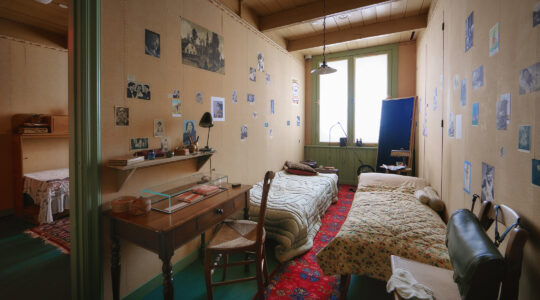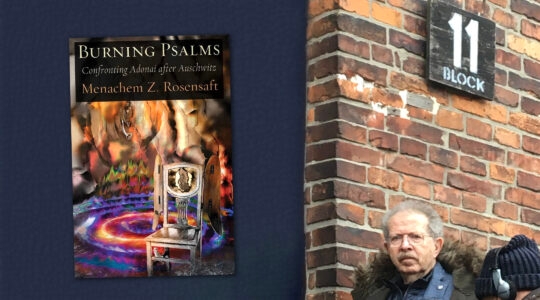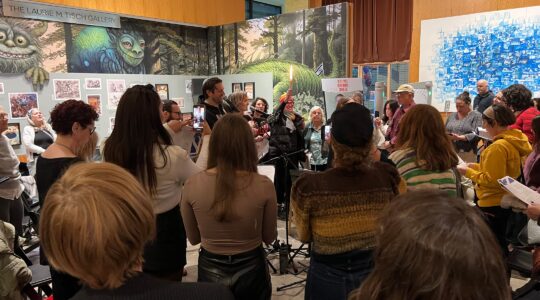It is oddly appropriate that the new Polish drama “Aftermath” is opening on Nov. 1, in the midst of the Halloween movie season. The film, written and directed by Władysław Pasikowski, is structured like a horror film, uses the tropes of the supernatural thriller boldly and deftly, and has its roots in the appalling realities of Jewish life and death in Poland in the 1940s. In short, it’s a Shoah film, but one that trades elements of that burgeoning genre for the familiar lineaments of another, older kind of filmmaking.
Until he co-wrote the screenplay for Andrzej Wajda’s “Katyn,” Pasikowski was little known outside of Poland, where he had a reputation as an efficient director of crime films and television programs. That is a training ground that stands him in good stead in “Aftermath.” Like many horror films about a stranger poking around into the past, it partakes of the structure of the detective film, only to gradually infect the rationalistic world of detection with the return of the repressed, usually in some ghoulish form.
The stranger is Franek Kalina (Ireneusz Czop), who has come back to the small farming town in which he was born to find out why his sister-in-law turned up on his doorstep in Chicago. His brother Jozek (Maciej Stuhr) never left Poland and nothing seems to have changed in the hamlet. But Jozek is estranged from his neighbors for reasons unstated but presumably sinister. Franek inevitably digs into the secrets and finds himself suddenly as unpopular as his younger brother.
Like any exercise in this genre, the film starts out blandly, rooted in the impersonal contemporary world of airport lounges and taxi stands. But as soon as Franek gets out in the country things get sinister, Pasikowski slows the cutting rhythms to emphasize uncertainty and menace, and bad stuff starts to happen. His brother greets him holding an axe, with the explanation, “It’s easier to use than a scythe at close quarters.”
That is the sort of homecoming welcome you’d expect in a film by George Romero (“Night of the Living Dead”). And Pasikowski handles the hostile, mostly silent locals the way Romero depicts his zombies in the “Dead” films. But where Romero’s target is the rampant consumerist-militarist culture he sees eating away at America, Pasikowski is interested in something less abstract and even more firmly rooted in the reality of recent Polish history and, quite literally, the Polish soil.
Jozek has triggered the hatred of his neighbors by reclaiming old Jewish tombstones and gradually erecting a graveyard in one of his wheat fields. Franek begins to probe the hidden tensions in the town, the threats against his brother and him, and he learns that the gravestones may be evidence of a post-war land grab. As a local bureaucrat says, “The Germans couldn’t take the land with them when they left, and there were no heirs.”
Ultimately, the truth is even starker and more brutal, and every family in the town is implicated, including the Kalinas. Pasikowski maintains a consistently ominous tone and, although the potential for rhythmic monotony is always lurking, his use of suspense/horror pacing is effective throughout. The result is a haunting film with potent echoes of “Poltergeist” and “Bad Day at Black Rock.”
“Aftermath” clearly struck a nerve in Poland. Right-wing nationalists organized protests against the film, managing to get some of its theatrical bookings canceled. For some mysterious reason, they chose actor Maciej Stuhr as the particular target of their vitriol; he received death threats after the film’s release and various neo-Fascist groups claimed he had Jewish blood. You could say that the opprobrium is a backhanded tribute to his excellent performance as the catalyst of the film’s conflicts, the rantings of people too thick to separate an actor from his fictional character. Undoubtedly, Stuhr feels like Mark Twain’s friend who was tarred and feathered and ridden out of town on a rail. His reaction, Twain recounts, “If it weren’t for the honor of the thing, I’d as just as soon walked.”
Regardless of the controversy stirred by the film at home, “Aftermath” is a handsomely crafted piece of work, a remorselessly downbeat film that takes genre conventions and puts them to highly intelligent use in the service of historical memory.
“Aftermath,” written and directed by Władysław Pasikowski, opens Friday, Nov. 1 at the Lincoln Plaza (62nd Street and Broadway; [212] 757-0359) and the Cinema Village (22 E. 12th St.; [212] 924-3363).
The New York Jewish Week brings you the stories behind the headlines, keeping you connected to Jewish life in New York. Help sustain the reporting you trust by donating today.




